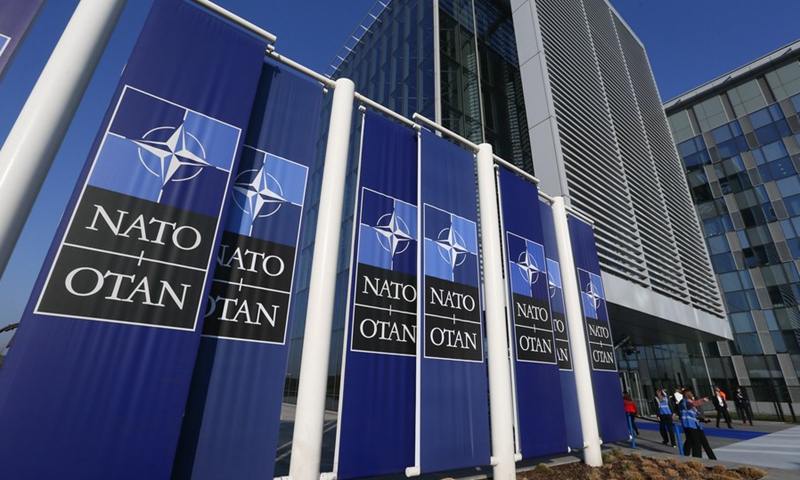
Staff members work at the NATO Headquarters in Brussels, Belgium, March 24, 2022.(Photo: Xinhua)
One of the strengths of NATO, which has allowed it to survive to its 75th anniversary on April 4, is its capacity to adapt to changing geopolitical landscapes. That is also why it is no longer the NATO envisaged by the founding nations as a bulwark against the Soviet Union at the end of the World War II, and the start of the Cold War. It is a new NATO.
This has brought changes in priorities and outlook, and it is on the cusp of evolving from a regional security alliance - whose main purpose used to be the mutual defense of its member states - to a global presence prepared to roll up its sleeves and charge headlong into conflicts in which its nations have no direct stake, but for which they are ready to restyle themselves as the world's police force. Is this even the job of NATO? One has to recognize that its intervention can often make things worse, not better. The organization's founding statesmen must be spinning in their graves.
NATO itself now sees its mission as far removed from the original intent of the North Atlantic Treaty which created it in 1949. As the opening preamble of the treaty itself acknowledged, the alliance grew from the determination of member nations "to safeguard the freedom, common heritage and civilization of their peoples, founded on the principles of democracy, individual liberty and the rule of law."
Crucially, it added: "They seek to promote stability and well-being in the North Atlantic area." It was believed that collective defense and mutual security were key to achieving these goals. Hence, Article 5 of the treaty declares that any attack on one ally can be considered an attack upon all, and that all can be called upon to come to its defense. This principle made NATO seem so strong in its youth, but now makes it so dangerous in maturity.
Contrast this with NATO's own understanding of its role in the world in 2024: "Essentially, NATO not only helps to defend the territory of its members, but also engages - where possible and when necessary - to project its values further afield, prevent and manage crises, stabilize post-conflict situations and support reconstruction." This changes its purpose from a straightforward security alliance into one which is intent on projecting its own worldview far beyond its borders, a political objective, not a military one. It is also extending the organization's geographical reach just as far as it or its members feel like. The Euro-Atlantic grouping has morphed into global NATO, with ambitions to become imperial NATO.
The association eagerly talks about engaging outside of its borders in order to ensure "stability at home." It seems a pretty dodgy doctrine - in the sense that sometimes it might work, and sometimes it might blow up in NATO's face. Look what happened when terrorists attacked the US on September 11, 2001 and Article 5 was invoked for the first - and, so far, the only - time in its history. The 18 other treaty signatories all pledged to support the American response, which was to invade one of the world's poorest countries, and wage war there for 20 years before pulling out and returning the now even poorer country to the Taliban, the very people the invasion was designed to eject from power. The consequences of this action are still being felt around the world, and will continue to be felt for generations. NATO made the world a more dangerous place, an ironic achievement as one of its key functions on the world stage is "crisis management."
Article 5 also means that the alliance - now swollen to 32 members, and counting, since the start of the war in Ukraine - is also at the mercy of the vicissitudes of Washington's notorious foreign policy adventures, which all too often involve the US in military operations, many of which result in unhappy consequences both for America and whoever else is involved.
This is particularly apparent in East Asia, where NATO's increased engagement has clearly been designed to counter China. It is difficult to see what this clumsy aping of America's strategy to "contain" China can achieve, especially for Europe. If anything, it can serve only to increase tensions in a region which already has more than its fair share of flashpoints (many due to Washington's interference).
NATO insists that it is not looking to expand its membership into East Asia by seeking new treaty signatories, but it has embarked on a policy of forging "partnerships" there. This is why Japanese Prime Minister Fumio Kishida attended last July's NATO Leaders Summit in Lithuania as a guest. Plans to open a so-called NATO "liaison office" in Tokyo were shelved after French President Emmanuel Macron said it would be a "big mistake." An unnamed French official told the media at the time: "NATO [stands for] North Atlantic, and both article V and article VI [in its statutes] clearly limit the scope to North Atlantic."
Following the end of the Cold War in Europe, there were predictions that NATO would be finished, and in a sense it is, in that today's NATO, in terms of ethos, form and function, is far removed from the 1949 version. But, while the 75th anniversary disproves predictions of its demise, what survives now is unrecognizable from the early alliance.
It is often said that NATO's success in the Cold War is demonstrated by the fact that tensions with the USSR never escalated into an actual war. But that was then. Unfortunately, today it seems less certain that the new, 75-year-old NATO will be able to make the same boast in the decades to come.
The author is a journalist and lecturer in Britain. opinion@globaltimes.com.cn




